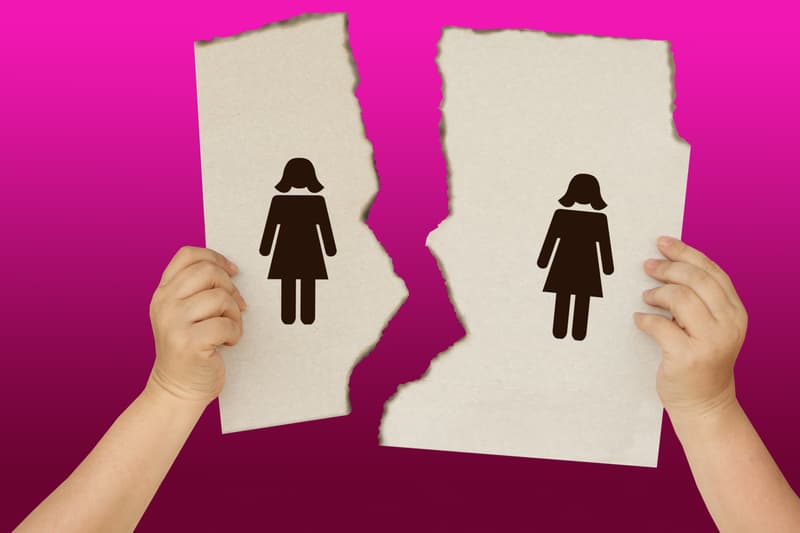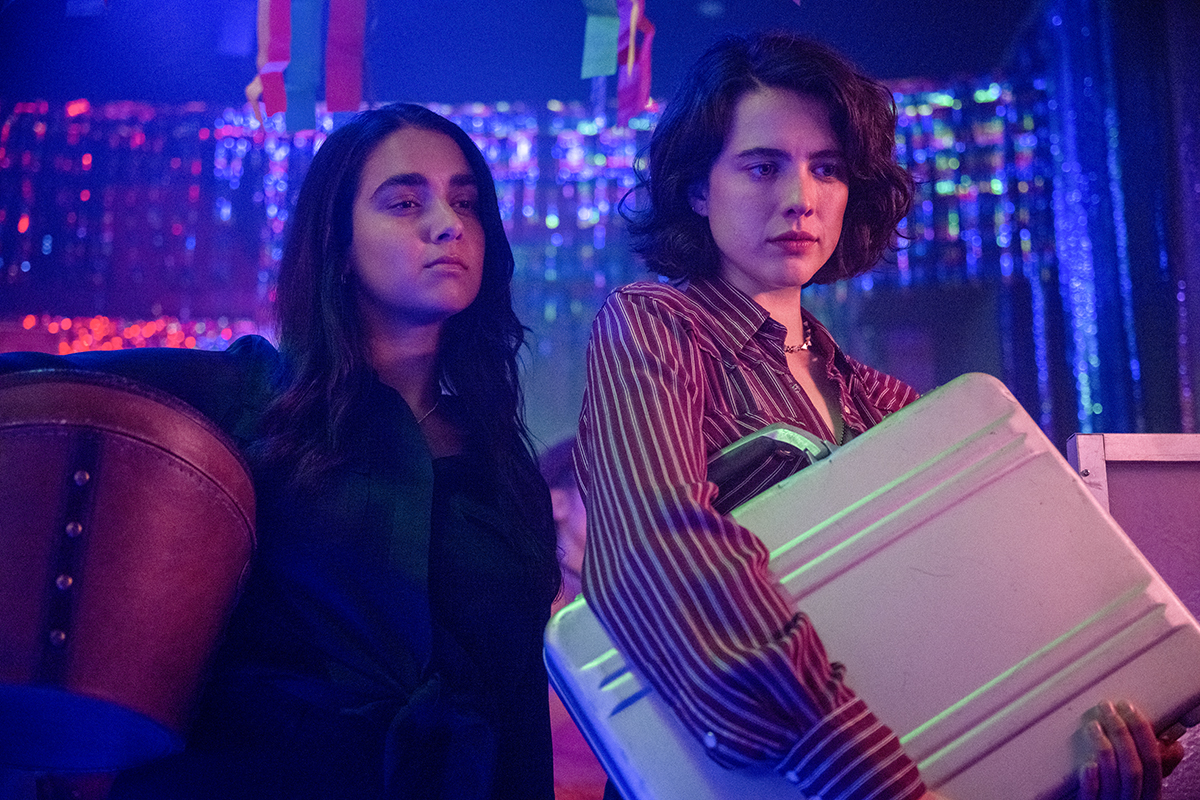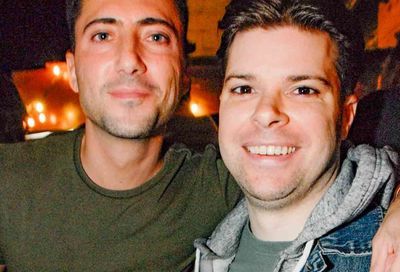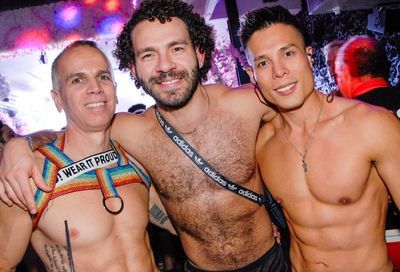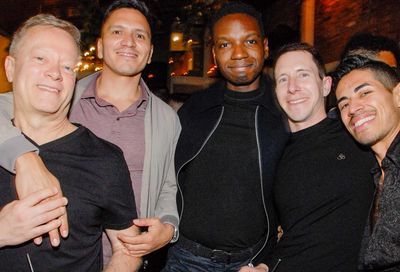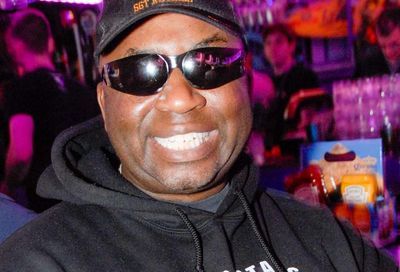Justice for All
Eight years after the Supreme Court struck down sodomy laws, lawyer Paul Smith looks to the future of LGBT equality
On March 26, 2003, Paul Smith argued to the United States Supreme Court that the justices should declare sodomy laws unconstitutional under the U.S. Constitution – despite the court’s opinion of less than 20 years earlier to the contrary.
He – and the team he was helping at Lambda Legal – succeeded, and the court agreed on June 26, 2003, with Justice Anthony Kennedy famously writing of ”[p]ersons in a homosexual relationship” that ”[t]he State cannot demean their existence or control their destiny by making their private sexual conduct a crime.”
Eight years later, with other prominent lawyers like Ted Olson and David Boies leading the challenge to California’s Proposition 8 – and with the first same-sex marriage victory fading into history – it’s easy to lose track of the changes that have happened since Smith and his firm, Jenner & Block, agreed to help Lambda Legal on the Lawrence v. Texas case.
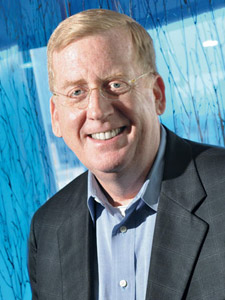
Paul Smith
”Paul never says that this was a big, brave thing to do or anything like that,” says Kevin Cathcart, the current executive director of Lambda Legal, “but I do think there’s a difference. First of all, there was a difference between 2002 and today, and secondly, I think there’s a difference between going to your firm and saying, ‘Let’s fight sodomy laws’ versus ‘Let’s fight for marriage rights.”’
Smith was not a prominent LGBT equality advocate when he argued the case – but he was already a respected Supreme Court lawyer, notably for First Amendment cases like the video game case – Brown v. Entertainment Merchants Association – that he argued before the court this term.
NPR’s longtime Supreme Court reporter Nina Totenberg calls Smith ”incredibly elegant” and says, ”He’s certainly in the absolute top echelon of people who argue Supreme Court appeals.”
Totenberg, who covers American legal affairs at NPR, is effusive in her description of Smith’s advocacy. ”He writes like a dream. His briefs are just beautiful. … He deals with the problems he has to deal with. I would say that a high-school student could read his briefs and understand the basic issues – and that’s a compliment.”
As for Smith’s arguments before the court, Totenberg says, ”There might be a dozen” – including Smith – who ”argue cases regularly and have incredible strengths as advocates before the court. It matters who makes these arguments because, while you can’t necessarily win by your oral argument, you sure as hell can lose.”
In that video game case, Smith did not lose. Justice Antonin Scalia struck down ”California’s effort to regulate violent video games” as unconstitutional under the First Amendment as ”the latest episode in a long series of failed attempts to censor violent entertainment for minors.”
In doing so, the conservative justice gave Smith – for whom the case was his 14th argument before the court – another victory. Yet, it was Scalia who harshly criticized the majority in a blistering dissent to Kennedy’s decision for the court in Lawrence.
At the time, Scalia wrote, ”Today’s opinion dismantles the structure of constitutional law that has permitted a distinction to be made between heterosexual and homosexual unions, insofar as formal recognition in marriage is concerned.”
Smith, who didn’t come out until his 30s, today has a husband. They were married in the District in 2010, shortly following the District’s passage of marriage equality.
Human Rights Campaign President Joe Solmonese, who often turns to Smith for guidance on legal questions, also points to Smith’s persona beyond his legal work.
”There’s his work – but then, there’s also Paul, himself,” Solmonese says. ”Paul has been such a great gift to this community – beyond just his brilliance in the courtroom. He’s one of the most genuinely, unconditionally generous and kind people that I’ve come to know through this work.”
Or, as Cathcart notes, ”Paul is just this amazing mix of incredible skill and accomplishment and then completely, low-key, regular, nice guy. Our movement would do well to have more regular, low-key, nice people.”
METRO WEEKLY: The way that most of the LGBT community is familiar with your work is obviously Lawrence. How did you get involved in that case?
PAUL SMITH: Well, I was a fairly well-known Supreme Court lawyer at that time, but hadn’t been particularly involved in the movement. And [Lambda Legal] actually came to a colleague of mine — Bill Hohengarten — first; they’d worked with him in the past on certain things. I’d done a little bit of stuff with them in the past, and we were asked whether we would consult on the question of whether they should go to the Supreme Court with this case, and if so, how? So Bill and I got involved. One thing led to the other, and then there was the question of the argument. So, Lambda Legal ended up deciding that they would rather have a veteran … argue the case.
MW: Lawrence is notable for how quickly the court overturned its precedent.
SMITH: Right, I mean it was 16, 17 years. It wasn’t that quickly. But in the time frame of the Supreme Court, I guess that counts as quick. [Laughs.]
MW: That’s only a few cases. I mean, what was your experience? How did you see Bowers v. Hardwick, the 1986 case upholding Georgia’s sodomy law that was overturned by Lawrence v. Texas?
SMITH: Well, Hardwick was a real problem for the movement because it wasn’t just that we had lost, but then you had this decision that said there’s nothing constitutionally wrong with putting people in jail for being gay. And so it actually was used as a weapon by everybody who wanted to defeat any other kind of constitutional claim you could bring. So, this was a situation where a loss ended up making things worse than if we’d never brought the case in the first place.
It was also a case that lots and lots of people — even people that had nothing to do with LGBT issues – just found repugnant in the way that it was written on the facts: Somebody comes into somebody’s house and arrests them for having consensual adult sex. And then, the way the court referred to any claim of constitutional right as facetious, that sort of thing. So, that case had a target on its back, in many ways, for a long time. But it took the right case to come along to deal with it.
One of the problems was that you couldn’t just bring a case arguing that Bowers should be overruled. You had to wait for somebody to actually be arrested and prosecuted before they could bring that argument to the Supreme Court. And the truth of it was that in those days there weren’t that many people who were arrested in a private setting. Two adults consensually engaging in sodomy was used as a weapon in other ways: People would lose their jobs if they admitted that they were in a gay relationship, they would lose their children if they were in a divorce fight and they admitted they were in a gay relationship, those sorts of things. It was a way of keeping people in second-class citizenship, indirectly. But it took Texas to produce the right prosecution to lead to the overruling of Bowers.
MW: Obviously, Scalia in his Lawrence dissent talks about the legal profession as a culture ”that has largely signed on to the so-called homosexual agenda.” Was Bowers seen within the legal profession as an outlier?
SMITH: Eventually. If you went back to the late ’80s, though, there weren’t any major law firms involved with the Bowers case. It was litigated by a law professor and by Lambda Legal and ACLU and people like that. The law profession changed starting in the ’90s and has changed even more rapidly since Lawrence, since 2003, to the point now where it is probably the single profession in the country most receptive to LGBT people. It used to be [that you would be] worried about revealing your sexual orientation in an interview with a partner at a big law firm, but nowadays it’s the best thing you can do to get a job. [Laughs.]
MW: In talking with people and looking at the changes between Bowers and Lawrence, a lot of it does seem to come back to AIDS and where the country was in the mid-’80s in terms of fears of gay people because of AIDS, and the way that the community needed to come together in a way that it hadn’t before.
SMITH: I would say it slightly differently. I think that what changed culturally between the ’80s and 2003, the time of Lawrence, was a vast increase in visibility of the gay community. Huge numbers of people coming out, the television, mass-media portrayals changing dramatically both in frequency and in the quality of the characters. Ellen and all of those sorts of things.
And you certainly can say that the HIV crisis was a big impetus for that change from a kind of more ghettoed culture to a much more open culture – and that’s just a fact, I don’t think there’s any doubt about it. But it wasn’t just that. If you think about the way the world changed — by 2003, there had been any number of law clerks for Supreme Court justices who were out. In 1986, I don’t think there were — and had ever been one. So that was a very big difference.
MW: With you existing as a part of this, how were you viewing these changes?
SMITH: I may not be the best observer of this. I was very late in coming out, I was very sort of personally unsure about whether that was the right thing for me to do. I was the sort of perfect little ”A” student guy who did everything I was supposed to do in life, and had my Supreme Court clerkship, and didn’t really come to terms with being gay until my 30s. So in that sense I don’t have the same perspective on all of these events of the ’80s and early ’90s that others might have had who were living through it in a more painful way in my generation, my age group.
MW: And yet your experience isn’t unusual.
SMITH: Not for people of my age. And I think even people younger, I think this phenomenon does continue to happen — people come to terms with being gay or lesbian at different times in their lives, that’s just the way people are. But certainly the greater visibility of the community, the greater role models of people out there who are successful professionals who are out – they presumably had an effect on my choices in life to change course as well.
MW: And what was that decision? What experience did you go through?
SMITH: I don’t know if there’s any particular climactic event. When you’re in your 30s, it’s a fairly common thing to say, ”Well, is this what life’s going to be for me? Are there going to be other things in life? Have I made all the right choices? Or do I want to change course either professionally or personally in some other way?”
So I did that reassessment and kind of painfully came to the conclusion that I’d made wrong decisions about getting married. And so, that started a painful process of changing course. I was lucky. In a way, I think it was much easier for me than it was for a lot of people, but it still was not easy.
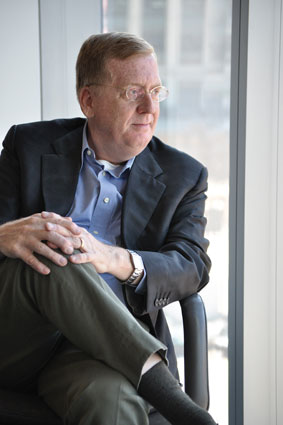
Paul Smith
MW: And where did that process lead? How did that impact your career?
SMITH: It didn’t impact my career.
MW: If you look from a biographical perspective, it obviously looks like it went well.
SMITH: Well, if you think about it, from a funny point of view, being the person who was in position to do the Lawrence case, I suppose you could say it had a positive effect on the career. [Laughs.] That wasn’t the intention.
MW: You weren’t coming out for Supreme Court arguments?
SMITH: [Laughs.] Not exactly, no. It was a personal decision, and you sort of make the best of things in life and you sort of muddle through. My ex-wife is still my best friend in many ways, so that makes it a lot easier.
MW: You were the board co-chair of Lambda, you are still on the board of Lambda. Just by virtue of having argued Lawrence, as well as everything else that you’ve done since then, you’ve clearly become one of the leading legal voices in the community.
SMITH: One of the things I tried to do after Lawrence was to kind of give back because I’d been given this wonderful opportunity to do something really important. Admittedly, Lawrence was really an accomplishment of a lot of people — Lambda Legal and elsewhere — who created this opportunity, but I got to be the one who stood up there. As a result, I had the opportunity to go around and raise lots of money and receive lots of awards and have some credibility, so I tried to give back in the ways I could by both going back on the Lambda Legal board, but also actually being the person who could work with lots of the organizations. I’ve had the really rewarding opportunity to do cases with [the National Center for Lesbian Rights] and with [Gay & Lesbian Advocates & Defenders], and have cooperated a lot with the ACLU and worked with the Human Rights Campaign. I’ve been sort of a free agent to some extent. But, even now, my first loyalty is to Lambda Legal. It’s been interesting. That’s only eight years ago, but those eight years have been quite a ride.
MW: You clearly know Paul Clement.
SMITH: I do.
MW: Probably one of the biggest LGBT issues regarding the world of big-law firms this year involved Clement and the really brief but high-profile representation by King & Spalding of the House Republican leadership and their defense of the Defense of Marriage Act. How was that situation handled in your view?
SMITH: I actually don’t know all the facts about how the internal processing at the firm were handled, so it’s hard for me to judge who was at fault in that situation. Clearly they ended up with a disagreement about whether this is a good thing for the firm to take on. And that’s not particularly surprising. There are such disagreements in law firms all the time, particularly about cases where the firm is not being paid its full freight, its full rates. “Do we want to invest our people and our time in this cause or this problem or another one? And what kind of political problems is that going to cause internally to the firm if there are lots of people who disagree with the position we’re being asked to take?” So, it’s not a particular surprise that there would be such a political problem. It would have been nicer if it was all decided before they had a big public uproar about it, but I don’t have any way to judge whose fault it was.
MW: I find it interesting that it was the representation of Congress in defending DOMA that led to this public debate and not the representation of Gibson Dunn [law firm] in trying to strike down Proposition 8. There was no discussion of this sort at that point about whether or not this was right for Gibson to get involved.
SMITH: I think there are differences. At this point in our cultural evolution, you have lots of out gay people in every law firm and so to take an anti-gay position is going to be controversial because you are essentially litigating against the interests of your own people. But, I think it’s a little hard for anybody at Gibson Dunn to complain that Ted [Olson] is litigating against the interests of the firm. There may be people in the firm who disagree whether there ought to be marriage rights in California, but that’s a little different from saying that they’re personally going to be worse off if the firm wins the case.
MW: You’ve hit at the argument of why the court ended up striking down, in part, Prop. 8. I mean, that was the question that Judge Vaughn Walker asked the Prop. 8 proponents about “what harm comes to you?” – and they had nothing.
SMITH: It’s one of the interesting issues in the whole marriage debate – there really isn’t any good response to the question of what’s the state interest in maintaining a distinction between same-sex couples and different-sex couples for marriage purposes. What’s the state interest? It’s not a question that anybody’s ever satisfactorily answered. Which is why I think the constitutional push will continue. Whether this is going to be the case that ends up going to the Supreme Court or not, I don’t know. But those arguments are very powerful because there simply isn’t anything that’s accomplished by discriminating.
MW: How do you view the impact of having somebody like Ted Olson leading up that team with David Boies?
SMITH: Well, first of all, they did a very good job in the trial – they’re very quality lawyers. [Laughs.] And I think the primary impact has been on public opinion and public awareness, because the publicity around the fact that Ted is doing this case, and doing it with Boies and the whole heightened awareness that that has produced is really quite remarkable. Ted has said publicly – so I can say – he asked me to be the guy who was his partner in that case first and, at the time, I certainly didn’t think it was something I could take on, in part because there was a lot of controversy about whether this was the right thing to do at that point and I was going to be the co-chair of Lambda Legal. But in many ways it worked out well because the Boies-Olson pairing had this nice echo of Bush v. Gore that led to lots more news stories than I think it would have been if the Olson-Smith pairing had been litigating.
MW: Is there anything you would have liked to have seen go differently in the past decade, in terms of the way that the movement has gone forward in terms of its litigation strategy?
SMITH: I don’t have any real criticism of the movement’s strategy decisions for the past decade. As a general matter, the movement is extremely well-organized and talks things through very carefully and tries to be strategic about these things. It’s somewhat unfortunate that courts have not been as receptive to Lawrence as I think they should have been in a lot of contexts. The first real disappointment was the Florida adoption case where the big fight was, “Does Lawrence really mean we really have to look at discrimination against gay people differently?” And the court in the Eleventh Circuit ended up being divided six to six on that issue and left in place the Florida adoption ban, which is the only state in the country that said – at least until very recently – “If you just admit you’re gay, you can’t adopt.”
And so it took five or six years for the momentum to build up on the understanding that Lawrence really does mean you can’t just discriminate on the basis of orientation without a very strong reason. But that momentum is building up. In the meantime, the state supreme courts in the marriage cases were enormously important in recognizing the message more quickly than the federal courts did. Starting with Massachusetts, of course.
MW: Marriage is both a legal and political win, but also a personal victory. Are you married?
SMITH: I am.
MW: And when did you get married?
SMITH: Last April.
MW: Here in the District?
SMITH: Yes, we said we’d get married when it meant something where we live. Then they called our bluff. It was nice. It was a lovely event.
MW: Evan Wolfson talks about the impact of having marriage in terms of the way that it changes the conversations. There was a moment at the LGBT Pride Month Reception at the White House when President Obama said “welcome” to people and somebody shouted out, “and spouses!” And he responded, “And spouses.” Does having a married gay man arguing in the Supreme Court in and of itself matter?
SMITH: Well, I think the reason why, after some initial hesitation, the whole leadership of the movement came around to the idea of fighting for marriage is because it matters a great deal. Once you accept the proposition that you can’t discriminate against gay couples in that area and that you have to give them equal respect and they ought to be treated exactly the same as other couples, it’s very hard to figure out how you could justify other kinds of discrimination: “You can’t discriminate in marriage rights but you can discriminate in public employment.” So, it is a way to cut through a lot of the step-by-step progress and really get to the process of equality more quickly – that is, at least, I think the way in which people decided that this was the right thing to fight about at the time.
MW: And have you personally seen any impact of that?
SMITH: In my personal life?
MW: Yes. You were talking earlier about out gay partners being a surprise. Now there are out gay married partners.
SMITH: I had many, many of my law firm colleagues come to the wedding. It’s not even an issue anymore. The level of comfort with being an establishment figure at a big institution like a law firm now is so different than what it was 10 or 15 or 20 years ago. I think marriage is sort of icing on the cake. It wasn’t so much the marriage thing that changed that, but the way the culture has changed, particularly in the legal profession as we talked about before.
MW: How would you like to see the process of further equality play out? There’s been a lot of debate about the power of democracy, and a lot of criticism of some of the president’s comments about democracy versus the power and the finality of the court decisions.
SMITH: The way civil-rights movements work is that there’s a kind of a dialogue between the democratic institution and the courts – and public opinion is involved in that dialogue, too. And so, a Lawrence case comes along, it changes public opinion, it encourages other courts like the Goodridge court in Massachusetts to do marriage rights. People learn enormous amounts from that in observing that whole phenomenon, and eventually the legislators are in a completely different posture than they otherwise would have been because public opinion is shifting and then, when legislators act, that in turn encourages courts in other places to recognize equality that they might not have otherwise recognized.
So, I don’t think you can talk about a choice between democracy and courts. There is, at this stage of the game, no way that we could give up either of those as a part of the movement toward equality. Ultimately, there are certain aspects of equality that will need to be done by federal statute, like employment discrimination, just as they were done for women and racial minorities. And there are other aspects that will have to be done by the Supreme Court. And I think there will be equal marriage rights at some point in this country, and it will probably come from a Supreme Court decision. Whether it will come in the next couple of years is a more complicated question.
MW: When do you think it will come?
SMITH: I don’t have a way to predict that. The one thing we are seeing is somewhat of a breakdown of that level of organization of the movement. It used to be there were only a small handful of lawyers out there litigating gay-rights issues. Now everybody’s litigating gay-rights issues. So I don’t think that the movement is going to be successful in keeping these issues from continuing to percolate up to the Supreme Court. And I think some of the initial hesitation about the Olson and Boies case in the movement has dissipated because people have come to recognize if they didn’t challenge Prop. 8, 67 other people would have – and at least they are doing it as well as they possibly can.
MW: What would you like to see receive more focus that isn’t getting attention now?
SMITH: I don’t think that there’s an issue out there that’s not getting attention. As with lots of non-gay people, there are an enormous number of people out there who have legal needs that are not being met. The civil justice system in this country is not well designed to actually provide legal services to middle-class and lower-middle-class people. Some poor people can get services. So I think there are lots of gay people who don’t get good legal services when they need them. It would be nice if we could figure out a way to meet more of those needs.
The hotlines at organizations like Lambda Legal get hundreds of calls. Part of the problem is there’s lots of places where there’s no law to apply to help people. But even where there is, there’s obviously a large unmet need for lawyers out there. That’s not by any means unique to the LGBT world, but it’s certainly an area in which there could be a lot more work done if we could figure out a way to deploy more people.
MW: What about you personally – what do you want to see for you in the years moving forward, with your career?
SMITH: I feel like I’ve been very lucky to be able to argue cases in the Supreme Court on occasion, get involved in the movement at a time when it is sort of a leading civil rights movement of our time, and play a role of advising lots of people about how to deal with Washington and the Supreme Court. And I’m happy to keep doing what I’m doing for the moment. I don’t have any great plan for some new next step at this point.
MW: What is the key thing that you think that people need to keep in mind as that moves forward, or the GLAD cases challenging Section 3 of DOMA?
SMITH: It makes sense for people to keep in mind that every movement toward equality takes time and has missteps that mean we can’t get there tomorrow. There are people who think we ought to be able to figure out a way to just slice through everything and get equality for everybody all of a sudden if we would just ask for it. And it is a much more difficult process than that. And this movement has been remarkably successful in spite of all the opposition and the horrible amendments that were passed around the country – but it’s not something that can be accomplished overnight. So there is a certain patience that, I think, people need to have when things go wrong – and they will go wrong again. There will be bad court decisions, and legislative defeats and maybe referendum defeats, but there are also going to be an increasing number of successes, too. So I would say people ought to remember how difficult this really is and just be in it for the long haul.
Support Metro Weekly’s Journalism
These are challenging times for news organizations. And yet it’s crucial we stay active and provide vital resources and information to both our local readers and the world. So won’t you please take a moment and consider supporting Metro Weekly with a membership? For as little as $5 a month, you can help ensure Metro Weekly magazine and MetroWeekly.com remain free, viable resources as we provide the best, most diverse, culturally-resonant LGBTQ coverage in both the D.C. region and around the world. Memberships come with exclusive perks and discounts, your own personal digital delivery of each week’s magazine (and an archive), access to our Member's Lounge when it launches this fall, and exclusive members-only items like Metro Weekly Membership Mugs and Tote Bags! Check out all our membership levels here and please join us today!





